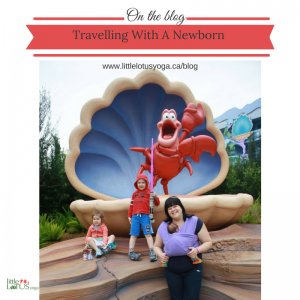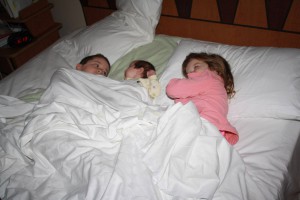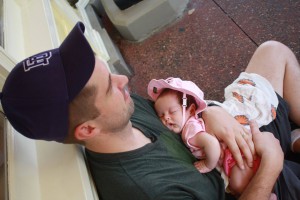Some parents feel overwhelmed by the thought of travelling with their newborn. Giving birth and dealing with any breastfeeding challenges and postpartum recovery can make travelling seem daunting. Mothers will know when they feel ready for a trip; for some, it can take only several weeks, but for others, it may be closer to two months.
Once past the immediate postpartum period, parents can discover that with some careful planning (and a little luck,) travelling with a newborn is a piece of cake. Toddlers…well, that’s a whole other blog post!

Travelling by plane
If you’re travelling to a foreign country, make sure you have the following in place before you pack your bags:
- Baby’s birth certificate
- Baby’s passport
- Immunizations (for babies 2+ months); chat with your doctor about common illnesses that may be encountered in the country, and how best to protect your newborn
Check your car seat at the gate, or bring it with you if you have purchased a seat for your baby and plan on having them restrained for the flight. Most parents find it easier to have baby on their laps. You will be able to bring your stroller to the boarding gate, where it will be checked and waiting for you upon arrival. Even with a stroller, many parents find it easier to wear their babies in a sling or wrap. Have a carry-on bag with everything you need, including a change of clothes and plenty of wipes and diapers.

On long plane rides, try to request a seat on the aisle, and close to the bathroom for diaper changes. If you are breastfeeding, make sure to wear a comfortable top and nursing bra. Some women worry about what passengers will think about breastfeeding, so pack a receiving blanket or cover if this helps to ease your anxiety. The majority of passengers will be helpful and friendly, and don’t forget you have a legal right to feed your baby.
Those who are bottle feeding will need to store their milk in a bag with a cooler pack, and security will give it a check. You will be allowed to take closed water bottles on your flight if you need to mix formula.
Very young newborns are sensitive to pressure changes, and their little ears may become sore at take- off and landing. As well, pressure changes can affect gassy babies when air expands in the intestines. Try breastfeeding and burping your baby right before you board, and then give them a pacifier to help ease the pressure. If they won’t take a pacifier, breastfeed small amounts and burp as often as you can.
If baby fusses, try to remember that most passengers are empathetic to your situation (with many having been there at least once!) If the seatbelt sign is off, ask the flight attendant if you can walk towards the back of the plane and bounce baby. If you are travelling with a partner, make sure to take a break for yourself if baby is having a hard time settling.
Travelling by car
If you are travelling by car with a partner, it may be helpful to sit in the back seat beside your baby. That way, baby can see your face and be soothed more easily. If you are driving alone, plan lots of extra stops in case baby is fussy. Some newborns sleep soundly in the car, while others will not be happy!
Car seats place added pressure on baby’s head, as well as their spine and hips. It’s important to make frequent stops to give your baby some stretch time. If it’s summer, plan for a picnic and lay baby out for some tummy time on a blanket. If it’s winter and you need to be inside, a sling or carrier can also help take pressure off baby’s head.
As with any trip, pack an extra change of clothes and extra diapers and wipes. Also, don’t forget a diaper change pad, as you may never know how clean the restrooms will be (or whether there is even a change table available.)
If you know your newborn does not enjoy car rides, consider taking the train or bus if this is an option. This way you can hold or feed your baby as often as required.
Go with the flow, and ask for help!
Travelling with a newborn is a unique experience, in that most newborns have no set routine. They will sleep and eat when they need to, so parents can feel a sense of freedom that there is no rush for meals or bedtime.

Despite some freedom, there can be challenges when dealing with a fussy baby, or a baby who is over-stimulated by all the changes brought on by travel. Recognize that plans will sometimes change – you may need to make more frequent stops, or skip activities once you arrive at your destination. Plan for less, and give baby time to adjust.
As with any parenting challenge, don’t be afraid to ask for help! Most people are very willing to carry a bag for you or even hold baby if you’re alone and need a bathroom break. Reach out to airline or train staff if you need extra accommodations.
Go with the flow as much as you can, and take time to slow down and enjoy your baby. You will cherish the memories of these early travel adventures!

Leave a Reply